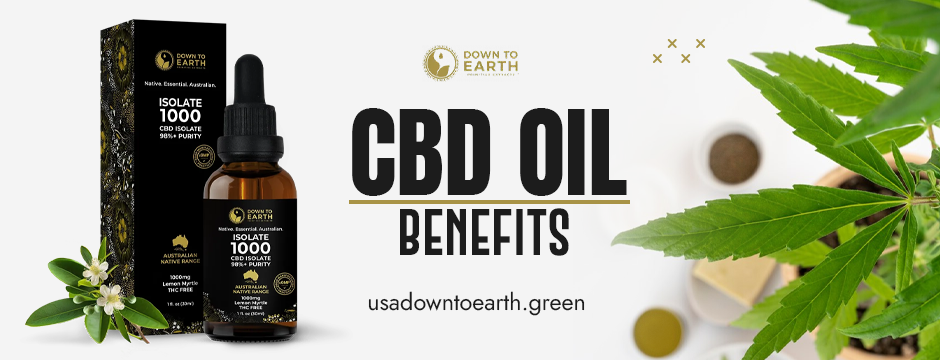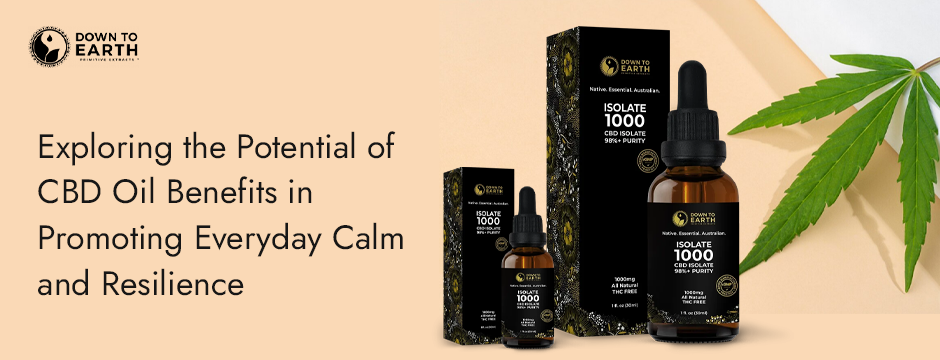Exploring the Potential of CBD Oil Benefits in Promoting Everyday Calm and Resilience
Cannabidiol, or CBD, is becoming a popular name among people who are looking for natural wellness solutions. Cannabidiol is one of the major ingredients found in the cannabis plant. CBD oil can be extracted from all kinds of cannabis plants. However, CBD oil is mainly extracted from hemp, which commonly refers to Cannabis plants that contain less than 0.3% THC (Tetrahydrocannabinol). THC is the main psychoactive compound found in the cannabis plant, and it also delivers a sensation of getting high. Unlike THC, CBD does not possess components that offer psychoactive sensations.
The CBD oils offered by Down To Earth include high minor cannabinoid shapes (e.g., 2% CBG, 2% CBC) and different flavors, like lemon myrtle. CBD at its core interacts with various receptors in our body and can provide quick relaxation and overall wellness. In this blog, we are going to discuss the CBD oil benefits and how it promotes everyday calm and resilience through its beneficial factors.
How CBD Acts on the ECS
CBD acts upon the Endocannabinoid System (ECS) by regulating its capacity for maintaining internal homeostasis. CBD does not bind directly to CB1 or CB2 receptors like THC, but might indirectly activate the ECS by inhibiting the degradation of natural endocannabinoids. CBD also acts upon other receptors, such as serotonin (5-HT1A), which can increase calmness and emotional stability. By this indirect communication, CBD facilitates activities like mood management, stress, sleep-wake cycles, and general homeostasis in the body.
Stress and Relaxation
CBD could indirectly aid in relaxation by facilitating ECS function and modulating GABA receptors, which contribute to the soothing of the nervous system. It doesn’t cure stress but might facilitate staying calm under stressful circumstances—like high-stress working environments or socially stressful situations—by aiding in ECS-guided balance.
Mood Support
CBD could potentially interact with serotonin pathways used in emotional control. While not a replacement for antidepressants or therapy, it could assist the ECS in creating a balanced mood. Users often report feeling emotionally supported, but the effects are not universal and not assured.
Sleep and Rest
Poor sleep impacts overall functioning and health. CBD may assist the ECS to affect relaxation, alleviating such factors as uneasiness or discomfort that disrupt sleep. Although not a sleep aid, it could induce a more relaxed state that facilitates healthy sleeping patterns, making some people feel more revitalized.
Recovery and Comfort
CBD’s effects on ECS receptors can aid in post-exercise recovery and general comfort throughout the day. By helping regulate inflammation and oxidative stress, it can contribute to overall well-being. It is not a substitute for physician-prescribed pain relief, but can be an addition to an active lifestyle.
Skin Health
CBD’s antioxidant and calming qualities can support the ECS in ensuring skin balance. External applications can soothe irritated skin or periodically dry skin. Such influences are indirect and do not substitute for skincare regimens or treat specific skin conditions.
The CBD oil benefits through the human ECS help in these cases in promoting everyday calm and resilience.
Specific Conditions: What to Know
CBD oil can support ECS function under acute discomfort or emotional stress, but is not medicated for disease.
Seizure Disorders
Prescription CBD oils like Epidiolex are available for some seizure disorders, whereas CBD is not standardized as an over-the-counter drug. OTC CBD should not be used to replace prescription medication and must only be used with medical supervision.
Anxiety
CBD could potentially aid the ECS in moderating emotional responses during experiences that precipitate stress, i.e., public speaking. Though it is not an anxiety disorder treatment, it can calm some consumers at the moment.
Chronic Pain
The ECS plays a role in the regulation of inflammation and pain. CBD can contribute to this system, perhaps adding to an individual’s feeling of physical well-being. It is not, however, used in place of analgesics or pain treatment and could be considered, at most, a supplementary measure.
Substance Use Disorders
Some studies indicate that CBD can aid the ECS in suppressing cravings, but it is not used as a solitary method of recovery. It is only to be used within planned, professionally assisted treatment programs.
Inflammation and Autoimmune Disorders
CBD can assist the ECS in managing inflammatory reactions, but does not cure or treat autoimmune disorders, and is to be applied with caution on top of prescribed medication, with professional guidance.

Safety and Considerations
CBD oil benefits are well tolerated by most people with minimal side effects, like fatigue or gastrointestinal upset. It has been shown to interact with enzymes such as cytochrome P450, which could affect drug metabolism. For safety, use products that have been third-party lab tested and have validated cannabinoid profiles (e.g., CBG, CBC content). Always consult a healthcare provider if taking medications.
Selecting Quality CBD Oil
Quality sourcing is essential. Good vendors like Down To Earth provide third-party-tested oils with open-label ingredients. Be sure to verify local laws before you buy, and don’t get unverified products with dubious content. Hence, choosing the quality CBD oil benefits may enhance your wellness perspective with everyday calm and resilience.
Practical Use and Expectations
Begin with 10–20 mg daily, sublingually, to facilitate faster absorption. Taper up over several weeks according to your tolerance. CBD is promoting wellness through the ECS; it does not cause immediate changes. Most individuals experience subtle gains in mood, stress tolerance, or sleep.
Limitations and Future Research
CBD’s full potential remains to be explored. Although some initial studies and anecdotal evidence are encouraging, stronger research is required, particularly in disorders such as PTSD or neurodegenerative disease. CBD must be considered a complementary factor in an overall wellness regimen, not a substitute for medical treatment.
Final Thoughts
CBD oil can create relaxation and resilience by maintaining stress reactions, mood, sleep, recovery, and skin function in equilibrium. CBD oil benefits on the ECS and serotonin provide relaxation without intoxication, attracting wellness seekers. Though it may not heal disease, CBD’s mild influence smoothes the day-to-day equilibrium if used responsibly. With ongoing research, its place in overall well-being could expand, making it an effective ally to life’s demands. For more information and to get the most out of CBD oils, you must visit the official site of Down To Earth.


